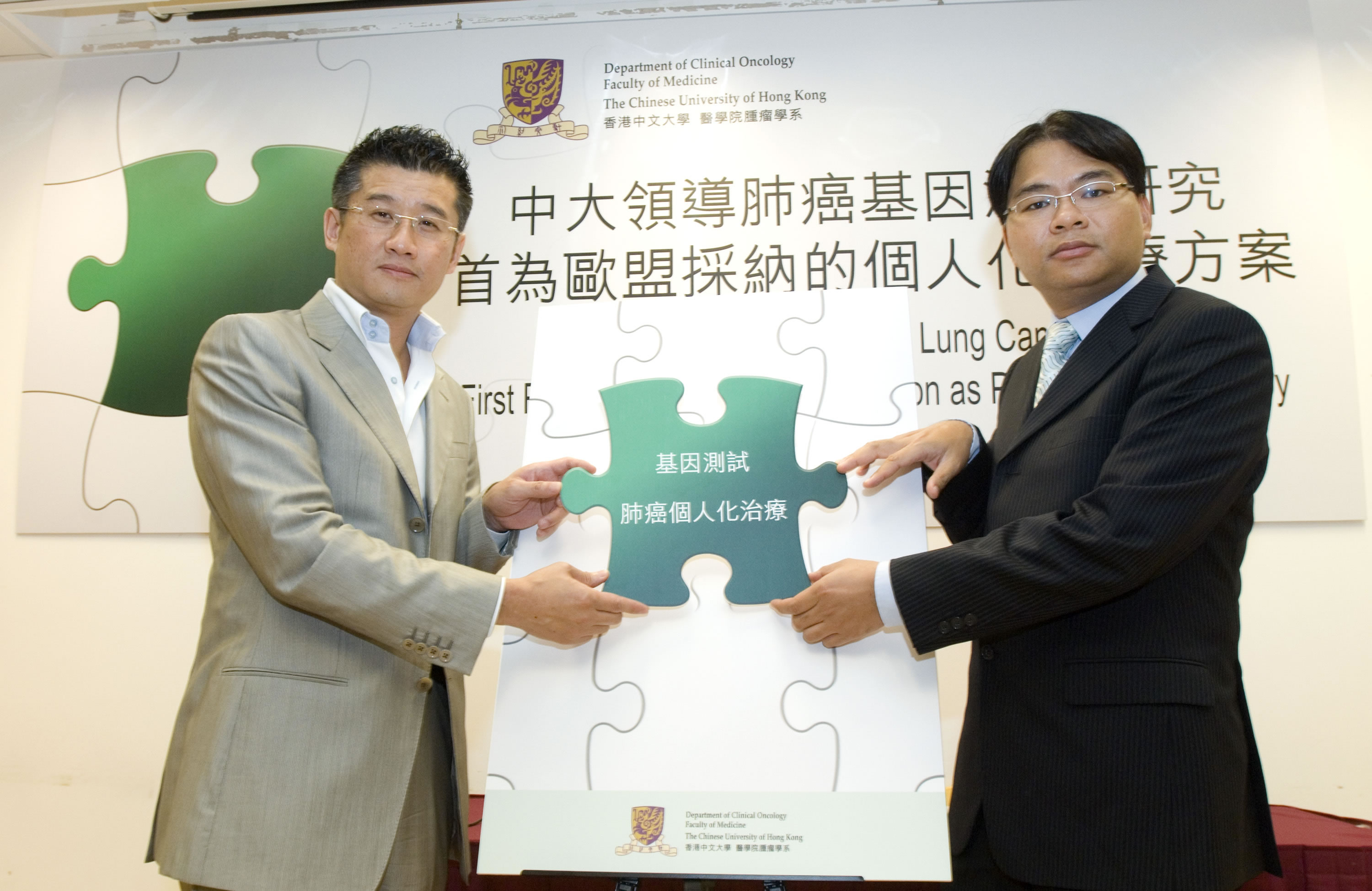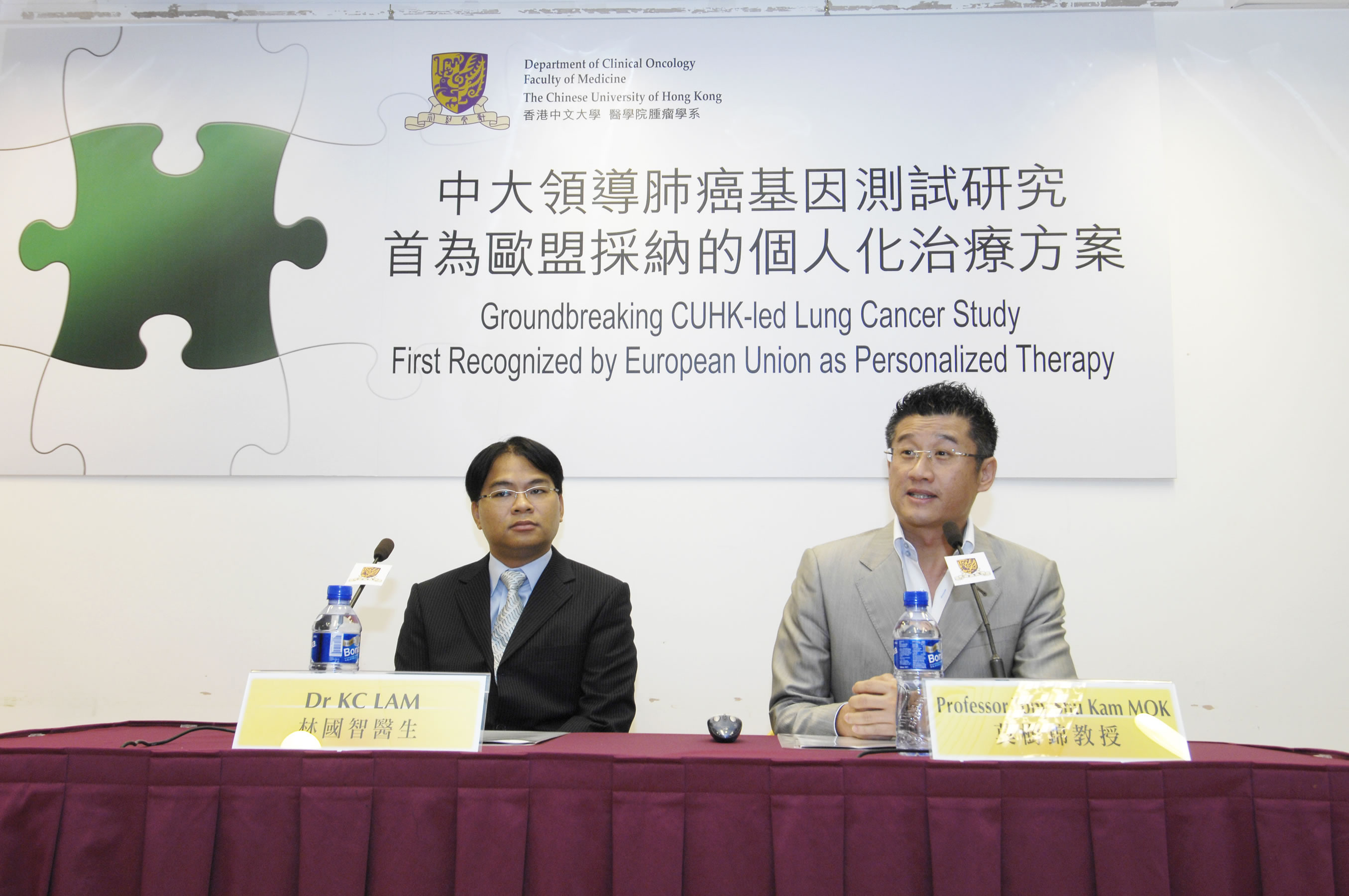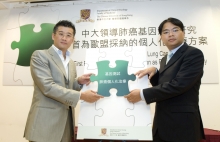CUHK
News Centre
Groundbreaking CUHK-led Lung Cancer StudyFirst Recognized by European Union as Personalized Therapy
Advances in science are making cancer treatments more personalized to individual patients, giving them longer survival periods and better quality of life. A study led by the Department of Clinical Oncology at The Chinese University of Hong Kong (CUHK) has found that gefitinib as a targeted therapy for lung cancer, if administered right after definite diagnosis, has a higher efficacy than the conventional intravenous chemotherapy for patients with adenocarcinoma harbouring epidermal growth factor receptor (EGFR) mutation, both in terms of the rate of progression-free survival (PFS) and cancer growth reduction.
Results of the CUHK-led study have been published in the latest issue of The New England Journal of Medicine. This is the first Hong Kong-led lung cancer study of its kind to be published in that journal. Based on the data of this study, the European Union’s (EU) medical authorities have recently granted gefitinib for lung cancer patients with EGFR mutation in all lines of therapy for advanced stage disease. This highlights the leading position that CUHK holds in lung cancer therapy studies worldwide.
Lung cancer is the most common cancer in Hong Kong, and its local incidence ranks the highest among advanced metropolises across Asia. Smoking and environmental factors such as long-time exposure to passive smoking, asbestos and radon, are known risk factors. In addition, activation of the EGF-EGFR signaling pathways will affect cell proliferation, survival and motility. The cause of EGFR mutation remains unknown.
CUHK leads the first Asian large-scale study on NSCLC
Lung cancer with EGFR mutation is relatively more common among Asian countries. Incidence of EGFR mutation in Asian non-smokers with adenocarcinoma is 60%, which is much higher than those in Europe and the US. Gefitinib is a novel oral targeted therapy that can control cancer growth. Currently, it is indicated for patients with pre-treated advanced non-small cell lung cancer (NSCLC).
Led by the principal investigator Professor Tony S K Mok from the Department of Clinical Oncology at CUHK since 2006, the IRESSA Pan-Asia Study (IPASS) was an open-label, randomized, parallel-group study of 1,217 Asians with advanced NSCLC. The study aims to assess the efficacy, safety and tolerability of gefitinib as a first-line therapy for lung cancer versus carboplatin/paclitaxel in the conventional chemotherapy. The primary objective of IPASS is to compare the PFS rates, and to demonstrate that gefitinib as a first-line therapy is not inferior to the doublet chemotherapy of carboplatin/paclitaxel.
The study population of 1,217 patients with adenocarcinoma of lung are treatments naive who are either non-smokers or very light smokers. About 35% of them are from mainland China and Hong Kong, 20% from Japan, and 45% from the rest of Asia. ‘This large-scale study is the first of its kind in Asia and has major impacts on lung cancer management, especially in Asia,’ said Dr KC Lam, Clinical Assistant Professor (Honorary) of the Department of Clinical Oncology, CUHK.
Gefitinib highly efficacious on patients with EGFR mutation positive
In the pre-planned subgroups’ analyses defined by the biomarker status of the patient’s tumour, it has been found that gefitinib is remarkably efficacious for patients with EGFR mutation, and their rate of progression-free survival is 50% longer than those who received chemotherapy. In terms of treatment side effects and control of cancer growth, gefitinib has proved to be more efficacious than chemotherapy. Results of IPASS have verified the efficacy of gefitinib as a first-line therapy for lung cancer with EGFR mutation.
New era of personalized therapy for lung cancer
Professor Tony Mok, principal investigator of IPASS, said, ‘The study is a milestone in personalised medicine for cancer patients. In the past, all patients diagnosed with lung cancer would take chemotherapy, but not all of them would benefit. Now our study has shown that gefitinib is more efficacious on lung cancer patients with EGFR mutation. The new paradigm is that doctors may check for EGFR mutation and prescribe a personalized treatment plan for the appropriate patient.’
‘The EU’s decision to grant registration for gefitinib as an all-line therapy for lung cancer patients with EGFR mutation will gradually help to generalise the EGFR testing. In Hong Kong, we have at least five institutes, including CUHK, which can offer the service. Moreover, the study has established Hong Kong’s leading position in clinical research. I believe we will be able to attract even more pharmaceutical companies to conduct clinical trials in Hong Kong, given that we have shown our data to have respectfully gained approval by the European Union,’ Professor Mok concluded.
Professor Tony SK MOK (left), Professor, and Dr. KC LAM, Clinical Assistant Professor (honorary) of the Department of Clinical Oncology, CUHK, put togther a puzzle, symbolizing lung cancer treatment will be tailor-made for patients as personalized treatment





